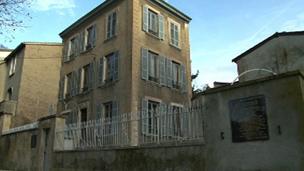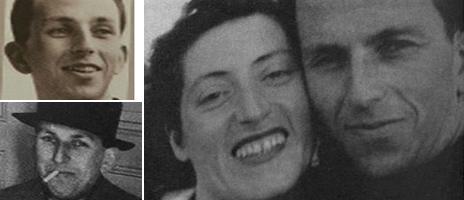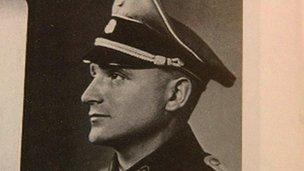Raymond Aubrac: How I tricked the Gestapo
- Published
Before he died in 2012 Resistance hero Raymond Aubrac spoke to Hugh Schofield about Jean Moulin's arrest
The capture of French Resistance hero Jean Moulin is one of the country's darkest chapters of the war. The last surviving Resistance leader, Raymond Aubrac, recalls that night and the audacious escape that followed.
Of all the momentous events that helped build the legend of the wartime French Resistance, one episode outstrips the rest for its combination of tragedy, mystery and high-octane drama.
In France they refer to it simply as the "raid on the house in Caluire". To the rest of the world, it is the story of how the Gestapo finally laid hands on Jean Moulin.
Jean Moulin was the former prefect who in January 1942 was sent by General de Gaulle to organise the anti-German underground. For a year-and-a-half, he travelled incognito around occupied France, using the pseudonyms Rex then Max.
Under his aegis, the Resistance grew from a patchwork of hostile grouplets into a unified structure with genuine fighting potential.
But the end came on 21 June 1943 at a doctor's house in Caluire, a suburb of the south-eastern city of Lyon. A clandestine meeting of Resistance leaders had been called to make arrangements following the arrest of a senior colleague.
But someone had tipped off the Gestapo and its notorious local chief Klaus Barbie. Moulin was arrested with seven others. After prolonged torture, he died on a train to Berlin.
Extraordinarily, some 70 years later, the man who walked with Jean Moulin across Lyon to take part in that ill-fated meeting - who actually stood next to him in the doctor's waiting-room as they were handcuffed by Barbie's men - is still alive to tell the tale.

The betrayal of Moulin happened in this house in suburban Lyon
Raymond Aubrac is France's last survivor from the senior ranks of the Resistance. He is 97 and slightly stooped, but otherwise hale and more than happy to relive those extraordinary times.
"What you have to remember is that when you are living your life on the run, as we were, you are constantly worrying about being arrested," he says.
"So when the Gestapo burst into the house, it was a shock but not a surprise. I was sitting beside Moulin and when the Gestapo burst in, he told me: 'I have a piece of paper in my pocket. Make it disappear.'
"So I put my hand in his pocket and took out the paper and swallowed it - which is not easy. I have no idea what was written on it.
"After the war, I came back to the house in Caluire - and there on the mantelpiece in the waiting-room was my pipe. Exactly where I had left it when the Gestapo came!"
Born in eastern France in 1914, Aubrac had studied engineering in Paris and in 1937 spent a year at MIT in Boston - hence his precise English.
He was also closely involved in left-wing politics - a supporter of the Communist party if never a member. After the outbreak of war, he married fellow left-winger Lucie Bernard; he saw brief military service during the battle for France before being taken prisoner and then escaping; and then in late 1940 the couple settled in Lyon.

The ingenuity of Aubrac's wife Lucie saved him from a death sentence
"I never 'joined' the Resistance because at the beginning there was nothing to join," he says. "It started off with us buying boxes of chalk and writing graffiti on walls. Then we progressed to writing tracts and putting them through people's letter-boxes.
"And then the third stage was our newspaper Liberation. It's when you have an underground press that you can first talk of an organisation - because you need a proper structure for it to work."
By mid-1942, Aubrac had become an important player in Moulin's nascent Resistance. The two men first met within days of Moulin's arrival by parachute in Provence, and Aubrac was put on the organising committee of the so-called "Secret Army".
This was the paramilitary body that brought together the fighting units of the various underground groups. In June 1943, it was the sudden arrest of the Secret Army's leader - Aubrac's superior, General Charles Delestraint - that triggered the Caluire conference.
By that time Aubrac had met Moulin on several occasions and, like everyone else, he had fallen under his spell. "He is very difficult to describe, because in physical appearance he was very normal - except perhaps his eyes," says Aubrac today.
"But it was his way of discussing matters that was so interesting. Never once did he use the way of authority. Don't forget he had real power - over money, over communications, over all the agents.
"And many in the Resistance could have seen him as an enemy. But he never forced his ideas on people. Instead he used a kind of Platonic discussion method, so that all views were aired.
"He was indeed a remarkable man. And do you know for the last 70 years, every time that I find myself confronting a problem I always ask myself what Moulin would have advised me to do. That was the kind of person he was."
After the Caluire arrests, Aubrac saw Moulin only one more time. It was at the Montluc prison in Lyon, were they were taken after the arrests.
"My cell was on the first floor. There were eye-holes in the doors which were meant for the guards, but we could also use them to look out. And the last time I saw Moulin, he was being carried down the stairs outside my cell by two SS men.
"He was in a very bad state. Only later did I learn that he was being taken to Paris, and from there on to Berlin. But he died on the way."
The Caluire meeting remains controversial to this day because of the continuing mystery over who betrayed it.
Aubrac is in no doubt that the most commonly accepted version is the correct one, that the culprit was a fellow Resistance member called René Hardy.
"Hardy was not supposed to be at the meeting. He was too junior. And when it came to the handcuffs, he was the only person not to have them put on. That meant he could make a run for it. And from all the Germans with their sub-machine guns, there were only a couple of scattered shots."
Hardy escaped. It later emerged that in the weeks before the Caluire rendez-vous, he had been detained by the Gestapo, giving rise to speculation he had been "turned". However after the war he was twice put on trial and acquitted.
Much more recently, Aubrac himself came under the spotlight, after a book was published suggesting he was the traitor. The writer based the theory on a number of contradictions and lacunae in the Aubracs' account of what happened. For example, it was not known until long after the war that Aubrac too had been taken prisoner prior to the Caluire meeting.
Raymond and Lucie took the writer to court and a committee of historians and experts cleared them of guilt. But the affair left a nasty after-taste.
Aubrac's subsequent story is another chapter of courage and derring-do. Within weeks of his arrest, he was sentenced to death by a court in Paris.

Klaus Barbie was the scourge of the Resistance
"But luckily they did not shoot me straightaway. That was standard practice. They would wait because they thought we could still be useful to them in some way." The delay gave Aubrac's wife Lucie time to come up with an escape plan.
How Lucie and her Resistance group sprang Aubrac from the clutches of the Nazis is today one of France's best-known stories from the war - as uplifting for the French as the Caluire episode is grim.
Somehow Lucie managed to persuade the German commander that she was a) pregnant by the prisoner Aubrac (this was actually true) and b) unmarried to him.
By feigning horror at the prospect of the child being born out of wedlock, she got the commander to agree to a pre-execution marriage.
And so on 21 October, the convoy taking Aubrac back to Montluc jail from his "marriage" ceremony at police headquarters was attacked by a heavily-armed Resistance gang. Three Germans were killed and 14 prisoners escaped.
"One of the Resistance cars overtook the truck in which I was being transported, and when the two vehicles were level they shot the German driver," recalls Aubrac, who received a ricochet bullet in the side of the face.
Second child
A few months later Raymond and Lucie were picked up by an RAF Lysander from a secret location north of Lyon and flown to London.
The call sign which was read aloud on the BBC to arrange the rendezvous was the line: "Ils partiront dans l'ivresse" (They will leave with elation).
"It was more or less true," says Aubrac, though presumably with elation rather than alcohol, because just a few days later, Lucie Aubrac gave birth to their second child at Queen Charlotte's hospital in London.
After the Liberation, Raymond Aubrac was appointed commissioner to govern Marseille, where his main concerns were ensuring food supplies and maintaining law and order during the period of rough anti-collaborator justice known as the Epuration.
Later he was given the job of overseeing the destruction of millions of mines and other live ordnance.
His post-war career took him to the UN's Food and Agriculture Organisation in Rome. He advised on decolonisation in Morocco and was a close friend of the Vietnamese leader Ho Chi Minh.
He and Lucie remained a close couple until her death in 2007.